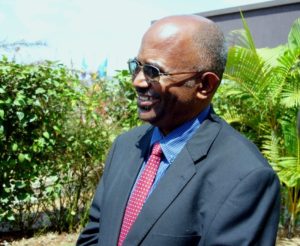
Dr. Abu Safian E Dafalla of COMESA (via irwanda24.com)
Liberalization of airspace in the Common Market for Eastern and Southern Africa should be expedited to boost regional trade and promote air travel.
According to Dr. Abu sufian Dafalla, the COMESA director for infrastructure and logistics, aviation is an essential life-line to intra-African trade and sustainable economic development in the trade bloc, and the continent generally.
“It is therefore imperative for COMESA members to fast-track the process of establishing legal, regulatory and institutional regional framework to guide the open skies initiative in the region to boost connectivity and trade across the region,” he said.
He encouraged governments to form partnerships, saying bilateral engagements are the primary tools that will help improve the continent’s aviation industry.
He called for the establishment of a uniform civil aviation policy, legal and regulatory framework on the continent, arguing that such a move is crucial to ensure sustainable development of the industry. Dafalla was speaking during a two-day COMESA consultative meeting on navigation, surveillance, air traffic management legal and regulatory framework in Kigali on Tuesday.
“Enabling aircraft [to] navigate seamless will boost airline business on the continent. We therefore need to set up the base on cross-border airspace navigations to facilitate movement and trade,” he said.
He called on governments to invest heavily in aviation infrastructure and skills development to support the industry.
COMESA has put in place a steering committee to establish how members can harmonize their airspace to ease air travel, cut costs and hence boost economic growth in the region.
The committee, chaired by Rwanda, is reviewing terms of reference on how the project can be implemented. However, sector players say the project that started in 2014 is taking long, costing airliners.
The project will cost $10 million USD (about Rwf8 billion); and the African Development Bank has already committed Rwf10 billion, around $12 million USD, toward the project, according to Dafalla.
The International Civil Aviation Organization has already urged members to upgrade and harmonize their terrestrial systems used for communication, navigation, surveillance and air traffic management to ensure safety and efficiency.
The organization’s contracting states have, for instance, agreed to gradually replace ground-based systems with satellite support systems.
Read more here.


